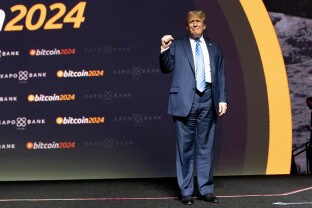A Department of Justice case that appears to involve leaders of a cryptocurrency company with ties to President Donald Trump is now proceeding entirely in secret.
The DOJ amended the case last week after NOTUS revealed that the alleged scam it detailed appeared to dupe executives behind MoonPay. Federal prosecutors also filed a separate sealed motion, and by Monday the court had sealed the entire case.
While the DOJ regularly redacts victims’ names, prosecutors do not typically seal entire cases unless they touch on sensitive national security matters or deal with ongoing investigations. The DOJ’s decision to initially file the cryptocurrency case in public — and issue a widely distributed press release about the charges — suggests it is not premised on highly sensitive information.
According to a filing that was public earlier this month, a Nigerian scammer posed as Steve Witkoff, a co-chair on Trump’s inaugural committee, using the common trick of swapping a lowercase “l” for an “I” and got two victims to send him $250,000 in ethereum.
The filing only lists two apparent victims, named as “Ivan” and “Mouna” in partially redacted emails in the original complaint. As NOTUS first reported, those are the same first names as the CEO and CFO of MoonPay. The cryptocurrency wallet address that the filing said was used to pay the scammer was earlier linked to MoonPay CEO Ivan Soto-Wright in a 2023 lawsuit.
MoonPay executives have bragged about raking in profits by trading the Trump family’s memecoin $TRUMP as an exclusive partner.
MoonPay did not respond to a request for comment. The DOJ declined to answer NOTUS’ questions about the case.
Since May, the District of Columbia U.S. attorney’s office — the district leading the case attempting to recoup the cryptocurrency funds — has been headed up by interim attorney and longtime Trump ally Jeanine Pirro. She is currently awaiting Senate confirmation to the post.
One former prosecutor who recently departed the office, speaking on condition of anonymity, told NOTUS that sealing an entire case this way was “unusual.” While it’s common for prosecutors to request filing certain documents under seal — related to national security or private medical records or a pending law enforcement operation — it’s an entirely different matter to close off public access to an entire docket. The former assistant U.S. attorney said that would keep the public from knowing when to show up to court for hearings or know if and when the case goes to trial.
“I think what they’re trying to say is, ‘We made a mistake and we don’t want anybody knowing about the mistake,’” they said. “It’s like they panicked.”
—
Update: After this story published Monday night, the case was unsealed on Tuesday morning.
Sign in
Log into your free account with your email. Don’t have one?
Check your email for a one-time code.
We sent a 4-digit code to . Enter the pin to confirm your account.
New code will be available in 1:00
Let’s try this again.
We encountered an error with the passcode sent to . Please reenter your email.


